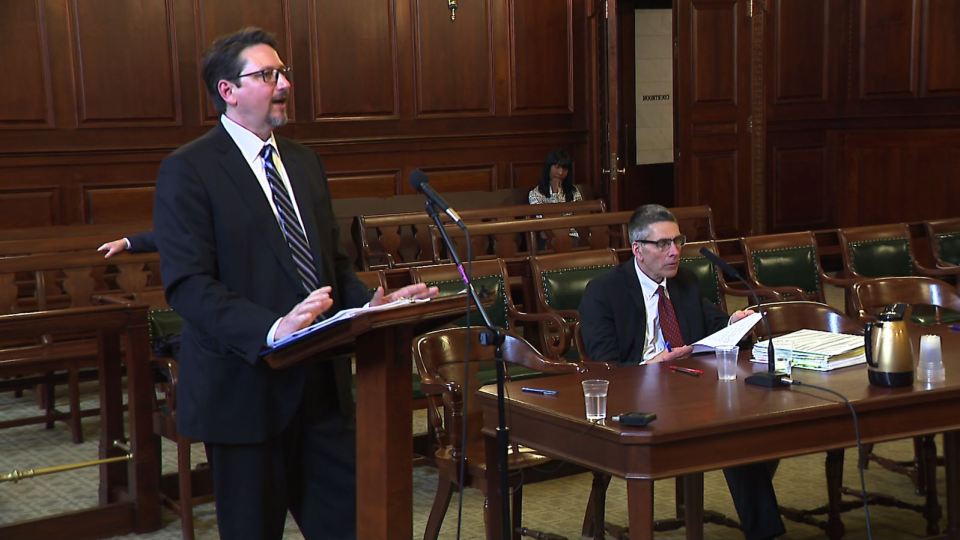Ethics Commission Unlikely to Appeal Overturned $200 Violation against Supreme Court Justice
By Eli Sherman
PROVIDENCE, R.I. – The state Ethics Commission is keeping its legal options open after a judge overturned a $200 ethics violation against a Supreme Court justice last week, but Executive Director Jason Gramitt said an appeal for further review is unlikely. “I don’t know that it’s likely we will seek further review at this time,” Gramitt told Target 12. The Ethics Commission met in executive session Wednesday to discuss the outcome of the Superior Court cases last week when Judge Brian Stern vacated the commission’s ethics violation against Supreme Court Associate Justice Francis Flaherty. The violation stemmed from a 2016 complaint accusing Flaherty of repeatedly failing to disclose his leadership position in a Catholic nonprofit while also ruling on a priest abuse case. Stern concluded in part the commission had failed to prove Flaherty made a “knowing and willful” violation. Gramitt described the decision as “narrow and limited,” meaning it would be more challenging to convince the Supreme Court to hear the case on appeal. Unlike an “appeal of right” case, which the Supreme Court would have to hear automatically if requested, the state’s highest court would choose whether to take on the administrative appeal that was overturned in favor of Flaherty – one of its own justices. (Flaherty would theoretically recuse himself from any proceedings.) Gramitt said convincing the Supreme Court to take on the case would also be challenging because it would require the commission to show the Superior Court’s decision might result in “imminent harm.” “The first hurdle is to convince the court that this decision of the Superior Court is going to have some lasting and substantial impact on the Ethics Commission,” Gramitt said. “That’s a pretty high hurdle.” The executive director also pointed out that while Stern overturned the violation, his decision wasn’t all bad news for the commission. During arguments, Flaherty accused the commission of having flawed procedures and not having constitutional authorities, which were mostly left out of Stern’s decision. “Those were large issues that were raised in the court, and [Stern] didn’t pay them any attention,” Gramitt said. The commission is technically waiting for a final order and judgment, which could happen within the next few days, before it has 20 days to decide whether to petition the Supreme Court for additional review. Until that time happens, Gramitt said, “all options are on the table.” But if the commission doesn’t appeal the case, it will likely end a yearslong ethics battle involving Flaherty. Helen McGonigle Hyde filed the original complaint against him in 2016, raising issue with the fact that he repeatedly failed to list his position as president of a Catholic nonprofit when filing financial disclosure forms with the Ethics Commission. Hyde, now an attorney, was one of two plaintiffs in a sexual abuse case that alleged rape at the hands of Rev. Brendan Smyth, who served in the Roman Catholic Diocese of Providence more than 40 years ago. Flaherty penned a unanimous Supreme Court decision against the lawsuit, which was thrown out in part because the accusations exceeded the statute of limitations. Separate from the abuse case, the Ethics Commission agreed with Hyde’s ethics complaint, claiming Flaherty should have disclosed his position with the nonprofit – a point Hyde reiterated this week after hearing about Stern’s decision. “He can’t credibly claim that was an innocent mistake,” Hyde told Target 12. “He should’ve known this is something that he should’ve been disclosing, especially while sitting on church cases.” After ruling against him last year, Flaherty appealed the decision to the Superior Court, where attorneys argued the case all over again for more than a year. For Stern, the issue boiled down to a simple question of whether the commission could prove Flaherty intentionally withheld the information. He ultimately decided it did not. “The Commission decision failed to make any findings that [Flaherty’s] actions were deliberate,” Stern wrote in his decision. When asked for comment earlier this week, Flaherty said through a spokesperson, “The decision speaks for itself.”
|
.
Any original material on these pages is copyright © BishopAccountability.org 2004. Reproduce freely with attribution.
